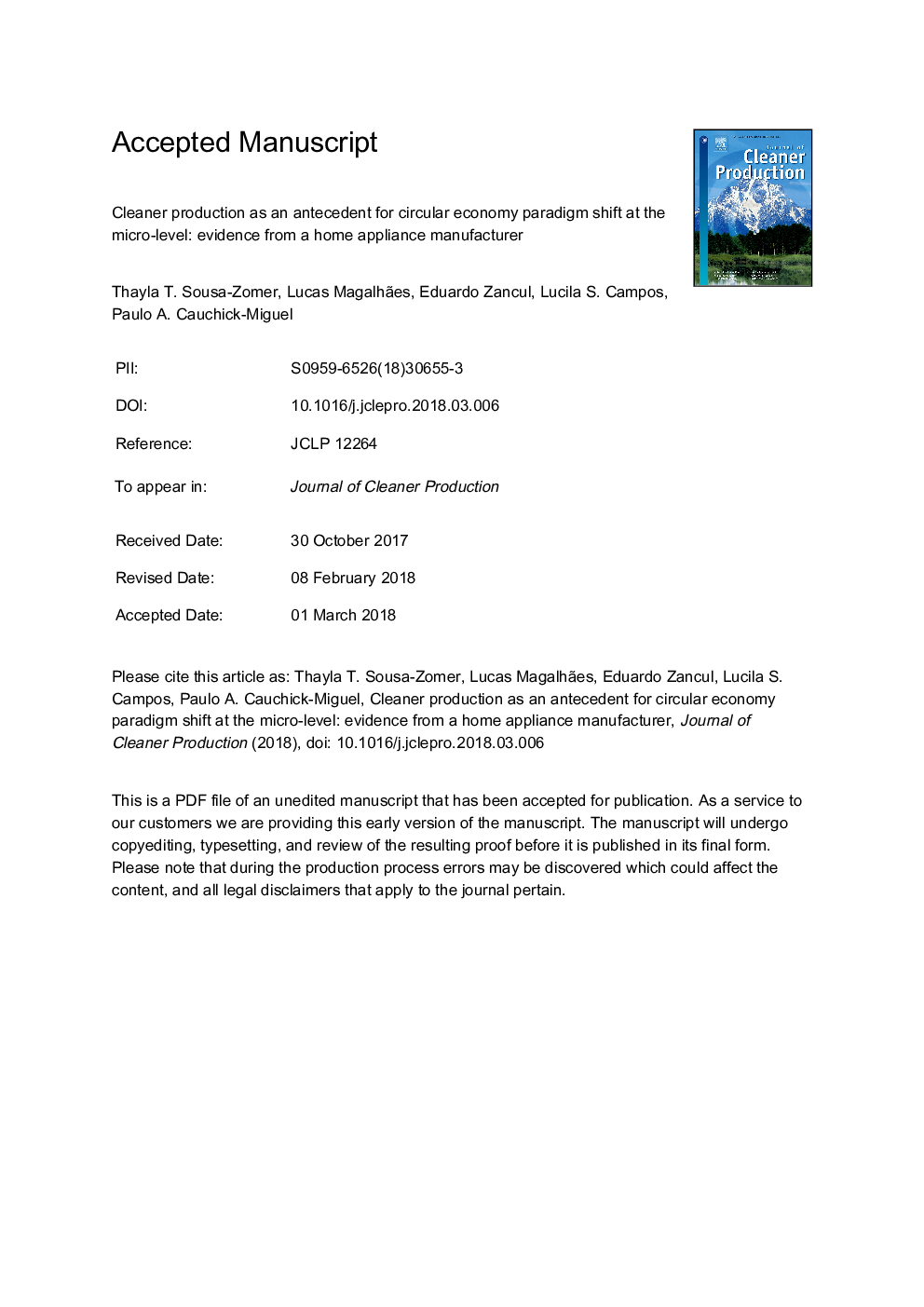| کد مقاله | کد نشریه | سال انتشار | مقاله انگلیسی | نسخه تمام متن |
|---|---|---|---|---|
| 8096557 | 1522068 | 2018 | 27 صفحه PDF | دانلود رایگان |
عنوان انگلیسی مقاله ISI
Cleaner production as an antecedent for circular economy paradigm shift at the micro-level: Evidence from a home appliance manufacturer
ترجمه فارسی عنوان
تولید پاک کننده به عنوان یک پیشگویی برای تغییر الگو پارامتر مدور در سطح میکرو: شواهد از تولید کننده لوازم خانگی
دانلود مقاله + سفارش ترجمه
دانلود مقاله ISI انگلیسی
رایگان برای ایرانیان
کلمات کلیدی
اقتصاد مدرن، سیستم خدمات محصول، تولید تمیزکننده، سطح میکرو،
ترجمه چکیده
مفهوم دایره المعارف به طور گسترده در ادبیات مورد بحث قرار گرفته است، اما اجرای اقتصاد مدور در سطح میکرو هنوز کشف نشده است. هنوز مشخص نیست که پیش شرط های اجرای اقتصاد مدور در سطح صنعت، به جای اصول تولید پاک تر، و شیوه های لازم برای پذیرش اقتصاد مدور از پایین به پایین مورد بحث قرار گرفته است، اما مطالعات تجربی بیشتری برای درک بهتر آن ضروری است تصویب و اثرات تولید پاک در ترویج اقتصاد مدور. بنابراین، این مقاله با هدف بررسی اصول و روشهای پاکسازی تولید که توسط یک شرکت تولیدی واقع در اقتصاد نوظهور صورت می گیرد، جهت درک چگونگی استفاده از این ارزش ها در کسب و کار اقتصادی مدرن است. در این تحقیق یک رویکرد تحقیق مبتنی بر مورد استفاده قرار گرفت. شیوه های اقتصاد مدور که توسط این شرکت معرفی شده است با در نظر گرفتن ارتباط آنها با الزامات در هنگام انتقال به پارادایم اقتصادی دایره ای، در فرآیندهای مربوط به شرکت علاوه بر مناطق اقتصادی مدور در سطح میکرو، مورد تجزیه و تحلیل قرار گرفت. یک رویکرد الگویی برای تحلیل داده ها برای توسعه گزاره های مربوط به تعاملات اقتصادی مدور به کار گرفته شد. یافته های اصلی نشان داد که شیوه های تولید پاک ساز برای بهینه سازی محصول برای اجرای دایره ای اقتصادی در مورد استراتژی های طراحی دایره ای ارزشمند است. اصل تولید پاک کننده جایگزینی جایگزینی برای کاهش ورود و استفاده از منابع طبیعی و همچنین افزایش سهم منابع تجدید پذیر و قابل بازیافت ارزشمند است. بهینه سازی تکنولوژیک می تواند به کاهش میزان انتشار کمک کند. علاوه بر این داده های میدانی نشان داد که شیوه های تولید پاکیزه در منطقه تولید، اقدامات اقتصادی دایره ای را در سطح میکرو انجام می دهد و همچنین ارتباط با سایر نقاط اقتصاد دایره ای (یعنی مدیریت، مصرف و پشتیبانی زباله) وجود دارد. علاوه بر این، یافته ها نشان می دهد که تمام شیوه های تولید پاک کننده و اصول اجرا شده توسط سازمان به یکدیگر و در سراسر فرایندهای متصل هستند. مطالعات بیشتر می تواند بر تست گزاره های توسعه یافته در این مطالعه در زمینه های دیگر تولید و همچنین بررسی روابط احتمالی علت و معلول بین تولید پاک کننده و مسیرهای گذار اقتصادی مدور متمرکز باشد.
موضوعات مرتبط
مهندسی و علوم پایه
مهندسی انرژی
انرژی های تجدید پذیر، توسعه پایدار و محیط زیست
چکیده انگلیسی
The concept of circularity has been widely discussed in the literature, but the implementation of the circular economy at the micro-level remains unexplored. It is still not clear what are the antecedents for circular economy implementation at the industry level, instead of cleaner production principles and practices have been discussed as essential for circular economy adoption from the bottom up, but more empirical studies are still necessary to better understand the adoption and effects of cleaner production in promoting circular economy. Thus, this paper aims to explore the cleaner production principles and practices adopted by a manufacturing company located in an emerging economy in order to understand how these were valuable in foster circular economy implementation. A case-based research approach was adopted in this investigation. The circular economy practices introduced by the company were analyzed by considering their connections with the requirements when transitioning to a circular economy paradigm, within company-related processes in addition to circular economy areas at the micro-level. An inductive approach was adopted for data analysis to develop some propositions regarding circular economy interactions. The main findings revealed that cleaner production practices for product optimization are valuable to circular economy implementation regarding circular product design strategies. The cleaner production principle of input substitution is valuable for reducing input and use of natural resources as well as increasing the share of renewable and recyclable resources. Technological optimization can contribute to reducing emissions levels. In addition, field data showed that cleaner production practices at the production area enable circular economy practices to be implemented at the micro-level, as well as there is a connection with other circular economy areas (i.e. waste management, consumption, and support). Moreover, the findings confirmed that all cleaner production practices and principles implemented by the organization are connected to each other and across the processes. Further studies may focus on testing the propositions developed in this study in other manufacturing contexts, as well as on the investigation of possible cause-effect relationships that may exist between cleaner production and circular economy transition pathways.
ناشر
Database: Elsevier - ScienceDirect (ساینس دایرکت)
Journal: Journal of Cleaner Production - Volume 185, 1 June 2018, Pages 740-748
Journal: Journal of Cleaner Production - Volume 185, 1 June 2018, Pages 740-748
نویسندگان
Thayla T. Sousa-Zomer, Lucas Magalhães, Eduardo Zancul, Lucila M.S. Campos, Paulo A. Cauchick-Miguel,
